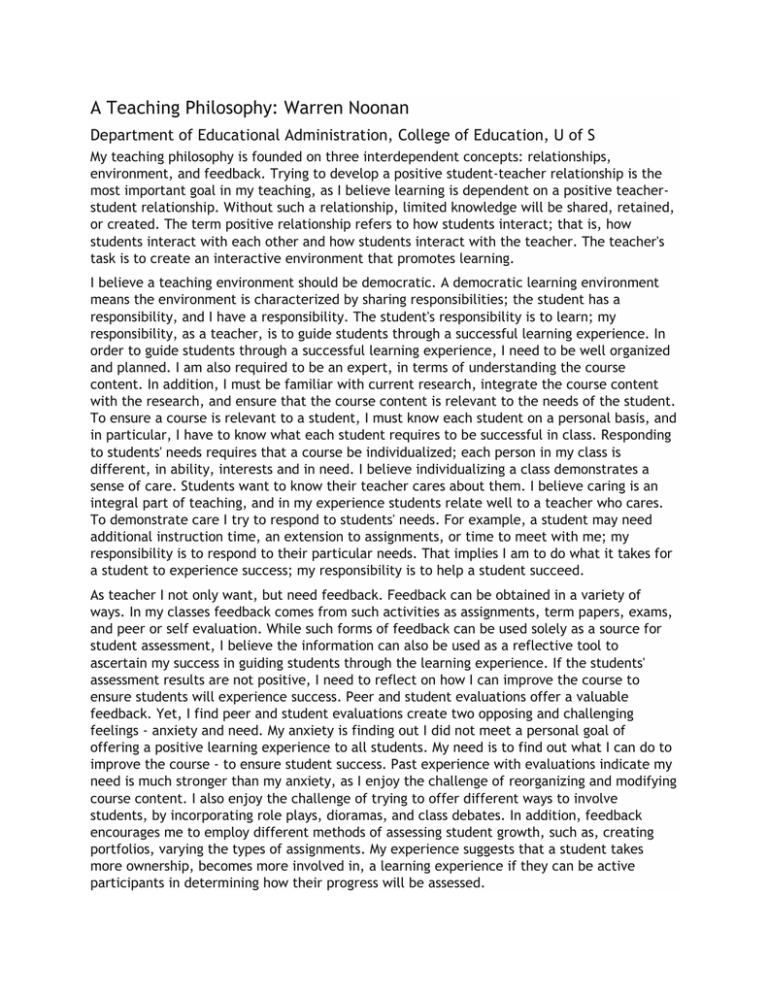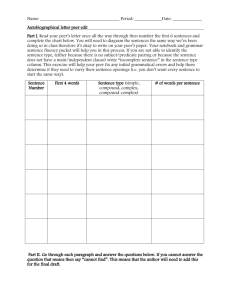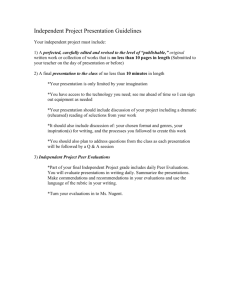A Teaching Philosophy: Warren Noonan
advertisement

A Teaching Philosophy: Warren Noonan Department of Educational Administration, College of Education, U of S My teaching philosophy is founded on three interdependent concepts: relationships, environment, and feedback. Trying to develop a positive student-teacher relationship is the most important goal in my teaching, as I believe learning is dependent on a positive teacherstudent relationship. Without such a relationship, limited knowledge will be shared, retained, or created. The term positive relationship refers to how students interact; that is, how students interact with each other and how students interact with the teacher. The teacher's task is to create an interactive environment that promotes learning. I believe a teaching environment should be democratic. A democratic learning environment means the environment is characterized by sharing responsibilities; the student has a responsibility, and I have a responsibility. The student's responsibility is to learn; my responsibility, as a teacher, is to guide students through a successful learning experience. In order to guide students through a successful learning experience, I need to be well organized and planned. I am also required to be an expert, in terms of understanding the course content. In addition, I must be familiar with current research, integrate the course content with the research, and ensure that the course content is relevant to the needs of the student. To ensure a course is relevant to a student, I must know each student on a personal basis, and in particular, I have to know what each student requires to be successful in class. Responding to students' needs requires that a course be individualized; each person in my class is different, in ability, interests and in need. I believe individualizing a class demonstrates a sense of care. Students want to know their teacher cares about them. I believe caring is an integral part of teaching, and in my experience students relate well to a teacher who cares. To demonstrate care I try to respond to students' needs. For example, a student may need additional instruction time, an extension to assignments, or time to meet with me; my responsibility is to respond to their particular needs. That implies I am to do what it takes for a student to experience success; my responsibility is to help a student succeed. As teacher I not only want, but need feedback. Feedback can be obtained in a variety of ways. In my classes feedback comes from such activities as assignments, term papers, exams, and peer or self evaluation. While such forms of feedback can be used solely as a source for student assessment, I believe the information can also be used as a reflective tool to ascertain my success in guiding students through the learning experience. If the students' assessment results are not positive, I need to reflect on how I can improve the course to ensure students will experience success. Peer and student evaluations offer a valuable feedback. Yet, I find peer and student evaluations create two opposing and challenging feelings - anxiety and need. My anxiety is finding out I did not meet a personal goal of offering a positive learning experience to all students. My need is to find out what I can do to improve the course - to ensure student success. Past experience with evaluations indicate my need is much stronger than my anxiety, as I enjoy the challenge of reorganizing and modifying course content. I also enjoy the challenge of trying to offer different ways to involve students, by incorporating role plays, dioramas, and class debates. In addition, feedback encourages me to employ different methods of assessing student growth, such as, creating portfolios, varying the types of assignments. My experience suggests that a student takes more ownership, becomes more involved in, a learning experience if they can be active participants in determining how their progress will be assessed. Teaching is a source of learning for me. While I may be the teacher - students have also taught me. They have taught me the importance of being flexible, of realizing there are many different ways to determine success and that student success is not restricted to grade scores. Students taught me to be more compassionate and hopefully be being more compassionate I become more caring. Students taught me that if I become more caring I can develop a more positive and supportive relationship with them and I believe relationships are the foundation of learning. I believe the challenge of teaching is being able to change, to adapt and to respond to the individual needs of a very diverse student population. Interestingly, the challenge also becomes the reward - of being a teacher.


